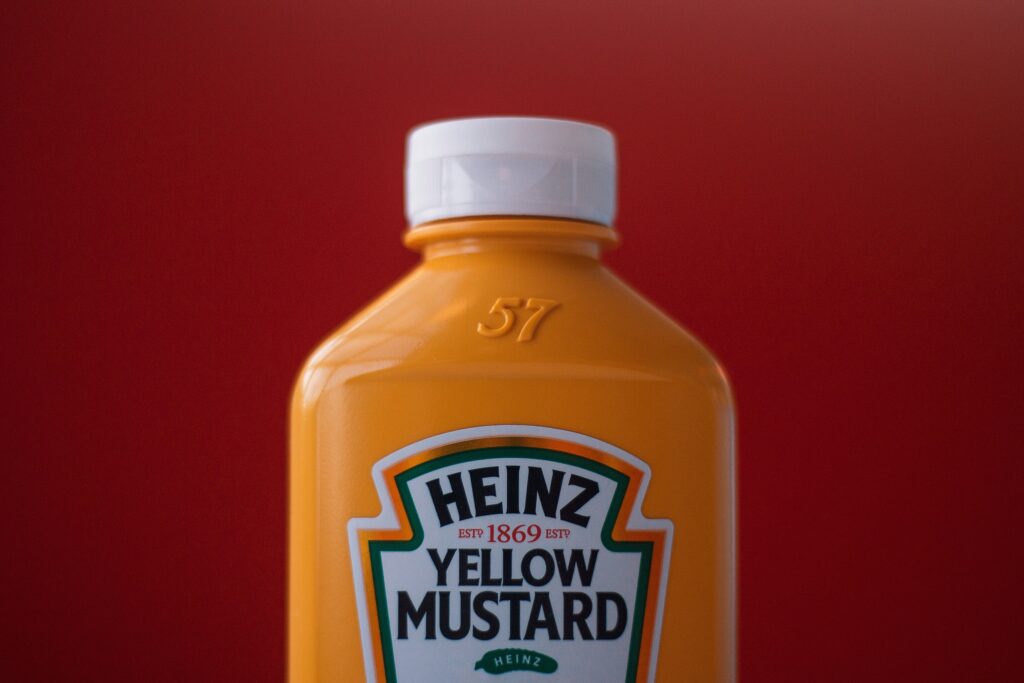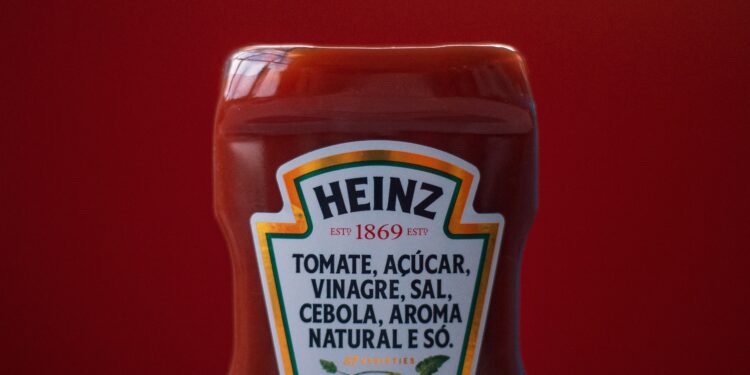The Kraft Heinz Company (NASDAQ:KHC) is one of the world’s largest food and beverage companies, with roots that stretch back over a century through the iconic brands of Kraft Foods and H.J. Heinz. The two companies merged in 2015 in a landmark deal led by Berkshire Hathaway and 3G Capital, creating a global powerhouse with a diverse portfolio of products recognized in households worldwide. Headquartered in Chicago and Pittsburgh, Kraft Heinz became the third-largest food and beverage company in North America and the fifth-largest in the world, with annual revenues exceeding $26 billion and a market presence in nearly 200 countries.
The company’s portfolio includes some of the most recognizable and trusted consumer brands, such as Heinz ketchup, Kraft Mac & Cheese, Philadelphia cream cheese, Velveeta, Oscar Mayer, Lunchables, Capri Sun, and Jell-O. These brands span across sauces, condiments, cheese, dairy, packaged meals, meats, and beverages, making Kraft Heinz a staple in supermarkets, restaurants, and homes alike. Its products reflect both traditional American staples and internationally relevant offerings, giving the company the ability to compete across multiple consumer categories.
Kraft Heinz has faced challenges over the years as consumer preferences shifted toward fresher and healthier options. Cost-cutting strategies in the years following the merger left the company slower to innovate, leading to market share declines and weaker U.S. sales. To address these headwinds, Kraft Heinz embarked on a multi-year transformation plan, investing in innovation, improving supply chain efficiencies, and divesting non-core businesses such as Planters nuts and parts of its cheese division. At the same time, it reinvested in core growth drivers like Lunchables and Capri Sun while innovating in areas such as plant-based offerings and packaging sustainability.
In 2025, Kraft Heinz announced a significant restructuring, splitting into two independent, publicly traded companies to sharpen focus and unlock shareholder value. One company, Global Taste Elevation Co., will oversee international and premium brands such as Heinz, Philadelphia, and Kraft Mac & Cheese, while the other, North American Grocery Co., will manage U.S.-focused staples like Oscar Mayer, Kraft Singles, and Lunchables. This separation represents both a return to simplicity and a bold step toward aligning the business with consumer trends and market realities.
Despite its ups and downs, Kraft Heinz remains anchored by its brand equity, global distribution network, and enduring consumer trust. With a renewed strategy focused on innovation, category leadership, and financial discipline, Kraft Heinz continues to be a major force in the global food and beverage industry. Its legacy of household staples, combined with a willingness to adapt, ensures its relevance in a competitive market and positions it as a resilient player poised for sustainable growth.
Kraft Heinz’s Legacy and Warren Buffett’s Role in Its Formation
The Kraft Heinz Company was born in 2015 from the blockbuster merger orchestrated by Warren Buffett’s Berkshire Hathaway and private equity giant 3G Capital. At the time, the deal created the third-largest food and beverage company in North America and the fifth largest in the world. With an unparalleled brand portfolio including Heinz, Kraft, Oscar Mayer, Velveeta, and Philadelphia, the company was envisioned as a dominant force capable of scaling efficiencies while leveraging consumer loyalty. Berkshire Hathaway became the largest shareholder with a 27.5% stake, cementing Buffett’s long-term interest in the business.
For Buffett, who had long praised the power of consumer staples and iconic brands, Kraft Heinz was a natural extension of his investment philosophy. While the initial years following the merger were challenging, with shifting consumer preferences and mounting competitive pressures, Berkshire maintained its position. Even after admitting in 2019 that he had overpaid for the company, Buffett stood by Kraft Heinz, underscoring the enduring value of its globally recognized products.

CHECK THIS OUT: CEL-SCI (CVM) Stock Could Explode After Saudi Breakthrough Deal and Ondas Holdings (ONDS) Lands $2.7M Defense Order.
The Strategic Split: A Return to Simplicity
In September 2025, Kraft Heinz announced a strategic split that will separate the company into two focused, publicly traded businesses. One arm, Global Taste Elevation Co., will oversee high-growth categories such as sauces, spreads, and international meals, anchored by powerhouse brands like Heinz ketchup, Philadelphia cream cheese, and Kraft Mac & Cheese. The other, North American Grocery Co., will concentrate on core staples like Oscar Mayer, Kraft Singles, and Lunchables.
This split marks a reversal of the very merger Buffett once championed, but it represents a deliberate effort to create operational clarity and unlock shareholder value. By simplifying its structure, Kraft Heinz can eliminate complexity, streamline decision-making, and tailor strategies to different markets. Global Taste Elevation can pursue international expansion and premium product innovation, while North American Grocery can focus on efficiency and defending its domestic market share. Despite Buffett’s personal disappointment, the market may reward the move for its potential to surface hidden value in Kraft Heinz’s diversified portfolio.
Buffett’s Disappointment and Market Reaction
Following the split announcement, Warren Buffett told CNBC he was “disappointed” in the decision, admitting that the original merger was not a brilliant idea but questioning whether dismantling it would truly solve the company’s problems. His comments triggered a sharp reaction on Wall Street, with Kraft Heinz shares falling more than 7% on the day.
However, Buffett’s pragmatic stance is worth unpacking. While he remains critical of the split, he emphasized that Berkshire Hathaway will continue to act in the best interests of its shareholders. This includes maintaining flexibility around its Kraft Heinz position while insisting that any potential share sale would only occur under fair terms offered equally to all shareholders. This discipline reflects the long-term nature of Berkshire’s investments and suggests that Buffett still sees underlying value, even if the company’s strategy has shifted from his original vision.
Learning From Past Challenges to Build Future Strength
Kraft Heinz’s struggles in the years following the merger were well-documented. Cost-cutting measures implemented by 3G Capital limited investment in marketing and innovation at a time when consumer preferences were shifting toward healthier, fresher foods. U.S. sales fell, and the company lost ground to competitors who were quicker to adapt to evolving trends. Between 2015 and 2025, Kraft Heinz’s shares tumbled nearly 70%, reducing its market value to $33 billion.
In response, Kraft Heinz pursued a series of divestitures, selling off businesses like Planters nuts and portions of its cheese division to streamline operations. At the same time, it began reinvesting in core growth areas such as Lunchables, Capri Sun, and Heinz sauces. These adjustments laid the groundwork for the strategic pivot announced in 2025, which aims to rebuild momentum by placing sharper focus on category-specific growth strategies.
Unlocking Shareholder Value Through Focused Growth
The bullish case for Kraft Heinz lies in the potential of the split to unlock shareholder value by creating two streamlined, growth-oriented companies. Global Taste Elevation can harness international growth opportunities and premium innovation, tapping into global demand for sauces, condiments, and convenient meal solutions. Meanwhile, North American Grocery has the chance to fortify its market share in everyday staples and capitalize on consumer demand for affordable, recognizable brands during periods of economic uncertainty.
Analysts often note that large conglomerates can suffer from being “too big to manage,” with sprawling operations masking the performance of individual business lines. By dividing Kraft Heinz into two entities, investors will gain clearer visibility into the performance of each segment, potentially leading to more accurate valuations and improved shareholder returns.
Buffett’s Enduring Presence as a Stabilizing Factor
Despite his disappointment, Buffett’s continued involvement as Kraft Heinz’s largest shareholder provides a stabilizing anchor. His presence signals confidence in the company’s ability to endure volatility and recover long-term value. Even as Berkshire prepares for leadership transition with Greg Abel poised to take over, the firm’s disciplined, long-term approach remains intact.
Buffett’s investment philosophy has always emphasized patience, brand durability, and consumer loyalty—all traits embodied by Kraft Heinz. While the road ahead may involve short-term turbulence, the fundamental strength of brands like Heinz ketchup, Kraft Mac & Cheese, and Oscar Mayer continues to provide a moat that competitors cannot easily replicate.
Conclusion: A Bullish Outlook Rooted in Reinvention
Kraft Heinz’s upcoming split represents both a recognition of past missteps and a bold step toward reinvention. Although Warren Buffett expressed disappointment, the long-term potential of creating two focused companies is substantial. By aligning strategies with market realities, enhancing transparency, and reinvesting in innovation, Kraft Heinz is positioning itself for renewed growth.
The near-term selloff following Buffett’s comments underscores the skepticism that still surrounds the company, but contrarian investors may view this as a buying opportunity. With iconic brands, a leaner structure, and a commitment to reshaping its future, Kraft Heinz offers a compelling bullish case. Its ability to adapt, simplify, and reignite growth could restore shareholder confidence and turn the page on a decade of underperformance.
READ ALSO: How Globalstar (GSAT)’s Strategic Apple Partnership is Changing the Satellite Game and Intel (INTC)’s Epic Comeback: Why Wall Street May Be Dead Wrong About This “Dying” Chip Giant.






